Climate Governance in Ethiopia
Attachments

The CAT Climate Governance series seeks to produce a practical framework for assessing a government’s readiness - both from an institutional and governance point of view - to ratchet up climate policy and implement adequate transformational policies on the ground, to enable the required economy-wide transformation towards a zero emissions society.
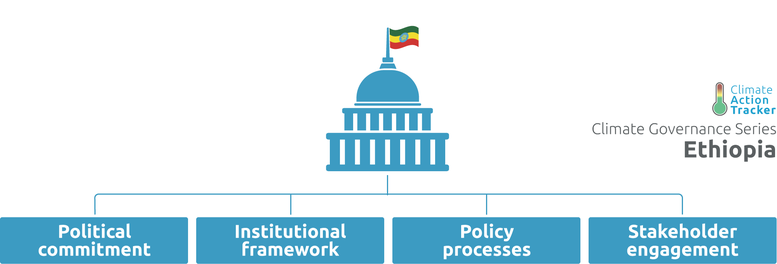
Our methodology
We have set up a framework that assesses and scores a number of indicators, where we rate various aspects of governance. This allows us to establish a common basis on which to compare climate governance across countries as well as identify areas of improvement and highlight positive developments. We have applied this framework at a national level only.
For the purpose and overview of this series, see our Climate Governance series main page. The methodology framework used for this assessment is here. For more detail on our methodology, see here: methodology page.
Assessment of national level readiness
Ethiopia’s national political commitment to climate mitigation is evident, but it is not a top priority. Leadership from the head of state and leading institutions is present but more needs to be done to ensure climate strategies are implemented and sectoral ministries exercise ownership over mitigation efforts.
While there is continuity of climate efforts across administrations, there is not the same commitment to ambitious action as when Ethiopia took early action and adopted its ten year climate strategy years ahead of the Paris Agreement. Although it is difficult to judge future commitment, it is likely that at least the current level of support would continue if there were a change in government. The Ministries of Finance and Environment, Forestry and Climate Change Commission have a strong reputation in delivering on climate change projects.
Institutional structures have mostly been established to facilitate coordination between ministries and, to a lesser extent, between other levels of government; however, these are limited by insufficient staffing and resources. Institutional learning may be affected by repeated restructuring of the lead climate institution. Ethiopia makes use of both domestic and international knowledge infrastructure. Efforts to improve staff retention and capacity would strengthen the established structures.
Many of Ethiopia’s processes for policy development, implementation and review are still under development. While climate mitigation has been considered in medium-term planning, with Ethiopia even adopting a 10-year climate strategy years before the Paris Agreement, long-term policy planning of national climate strategies is not fully developed. Ethiopia has not adopted an emissions reduction target for 2050, though it has set a long-term goal in its NDC to become carbon neutral. While the target date for carbon neutrality is undefined, this goal was an exceptional commitment from Ethiopia at the time it was made. Some progress has been made in developing a transparency framework; however, more work needs to be done for these to be operational and effective. Review and ratchet up mechanisms can also be strengthened.
The Ethiopian government engages the public through stakeholder engagement processes and has undertaken other education and outreach measures. While there is public awareness and support for climate change action, it remains low on the list of development priorities. The government does not have a formalised strategy to address the potential negative externalities of climate policies or the need for a just transition. Exogenous non-state actors have limited influence on decision-making.
Ethiopia is a Least Developed Country and faces a number of development challenges, which pervade much of the ability and priority to deliver on governance readiness to transition to a zero emissions society. However, this is not a permanent limitation on the transition and can be overcome with strong domestic leadership and support from the international community.1
1 The analysis for this report was completed in October 2020, before the recent escalation in the country's internal conflict (Marks, 2020).
Rating system
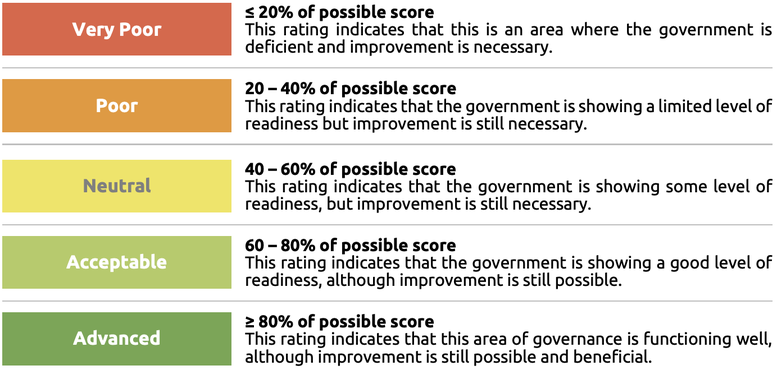
We analyse a number of different criteria of governance under four categories that cover the key enabling factors for effective climate action. We give each a rating as outlined above (very poor - poor - neutral - acceptable - advanced). The methodology framework used for this assessment is here. For more detail on our methodology in general, click the link below.
Ratings and Recommendations
The following section outlines the results of the analysis for each of the different categories and criteria as well as our recommendations for each category of governance.

- Scale up leadership advocacy beyond support for tree planting to all measures necessary for a transition to a zero emissions society.
- Establish an explicit legislative mandate for relevant line ministry to reduce greenhouse gas emissions and ensure active engagement of all line ministries in the implementation of the Climate Resilient Green Economy (CRGE) Strategy and its successor.

- Improve the various coordination mechanisms within government by ensuring the bodies meet regularly with a sufficient level of seniority and that implementation of decisions made is monitored.
- Increase staffing and resources of the Environment, Forest and Climate Change Commission, Climate Resilient Green Economy units within ministries, and regional CRGE units to advance implementation of the climate strategy.
- Seek to maintain a stable institutional framework to address the transition in order to enhance institutional learning.

- Build on the early success of establishing a carbon neutral goal, by adopting a long-term strategy to support that goal and ensure that this long-term vision is considered as part of near-term policy development.
- Continue to develop and strengthen the transparency framework, with a focus on tracking progress on mitigation measures.
- Establish a formal ratchet up mechanism to scale up climate action in line with the Paris Agreement’s five-year cycle.

- Continue to strengthen efforts to engage stakeholders in policy development.
- Strengthen public awareness and outreach efforts around climate mitigation.
Ethiopia's Climate Governance
These tables from the report give an overview and analysis of the key factors of Ethiopia's governance to enable effective climate action. We have looked at the country's key institutions, strategies, targets and legislation.
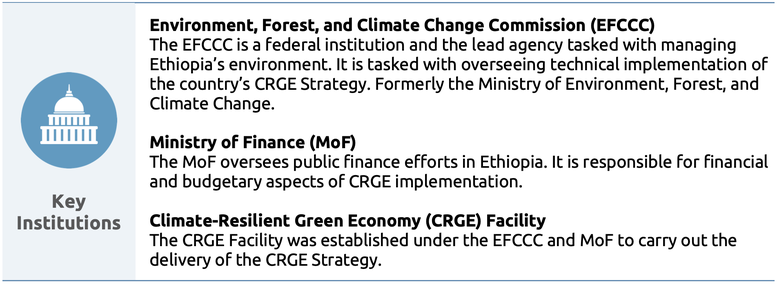
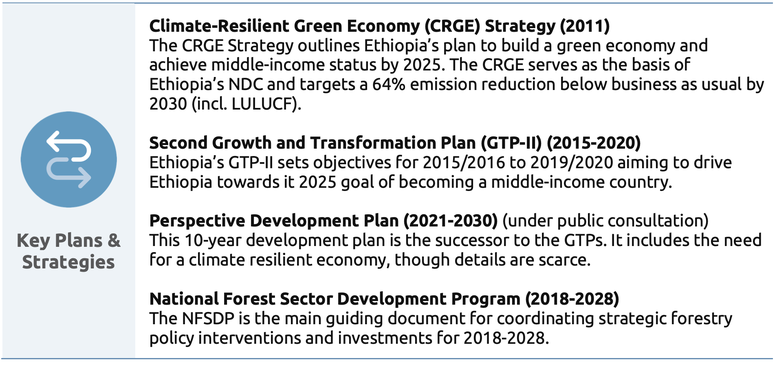

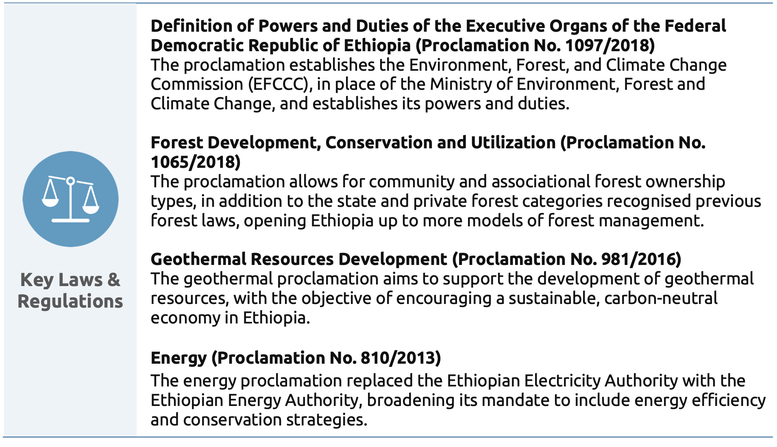
Stay informed
Subscribe to our newsletter